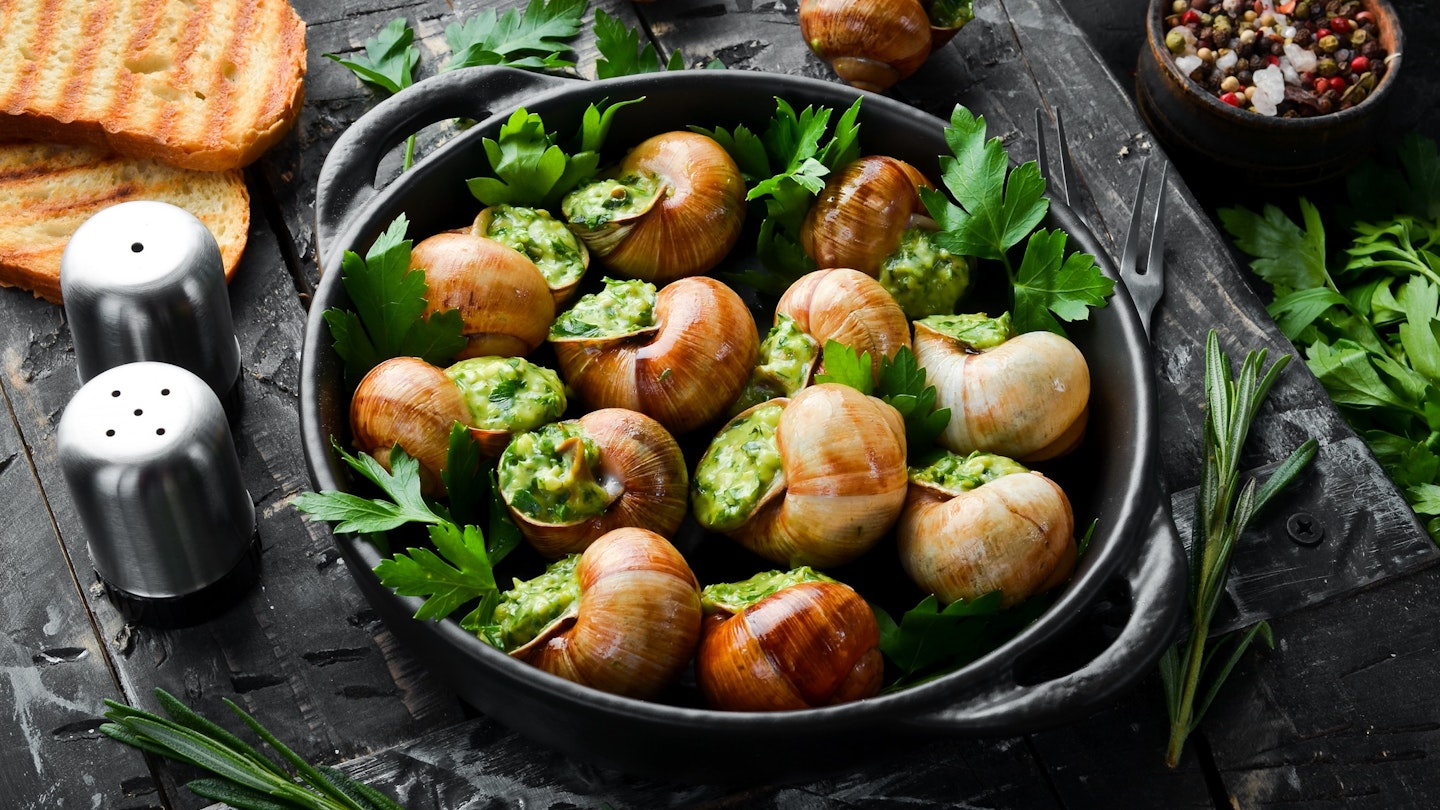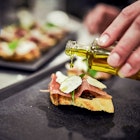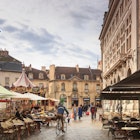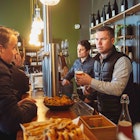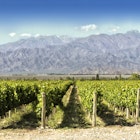With a natural larder of fertile fields, lush pastures, wooded valleys and rolling hillsides of vineyards and culinary techniques perfected over centuries, Burgundy (Bourgogne in French) encapsulates the best of France for epicureans.
Here, prized poultry, beef, snails, truffles, mustard, cheeses, blackcurrants, honey and gingerbread star alongside some of the finest wines on earth in dining experiences from markets to Michelin-starred meals you’ll remember for a lifetime.
At the heart of Burgundy’s sublime food and wine is the terroir – the distinct characteristics of the land’s geology, geography and climate that give produce and products their unique qualities and flavor.
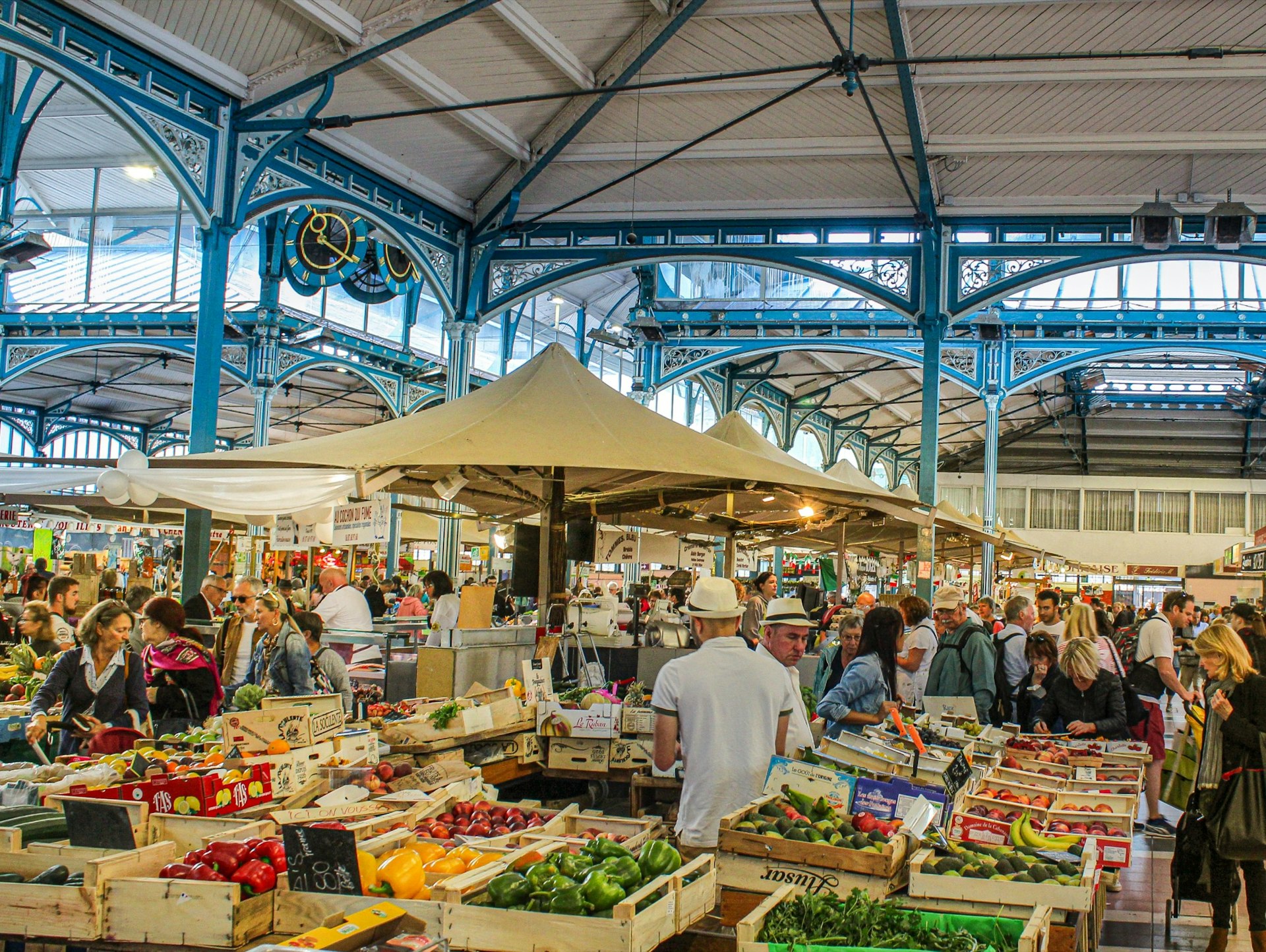
Markets of Burgundy
Farmers, artisans and purveyors bring their wares to lively morning markets across Burgundy’s towns, cities and villages as they have for generations. Browsing stalls piled high with fresh fruit, vegetables, meats, fish, cheeses, breads and all sorts of delicacies while mingling with passionate vendors, residents and chefs sourcing seasonal ingredients is one of Burgundy’s greatest pleasures.
Dijon’s the 19th-century wrought-iron covered market, open Tuesday and Thursday to Saturday, is a national monument. In the Côte d'Or (“Golden Hillside”) winegrowing region, Beaune has markets on Wednesday and Saturday. Mâcon, the hub of the Mâconnais vineyards, has its market on Saturday. Chagny’s Sunday market is renowned for its quality.
Specialty markets include marchés aux truffes (truffle markets), dedicated to pungent truffes de bourgogne (Burgundy truffles; Tuber uncinatum), which are held annually in a number of towns across the region such as Noyers-sur-Serein and Nevers.
Bonding over Burgundy: Nourishing outdoor adventures
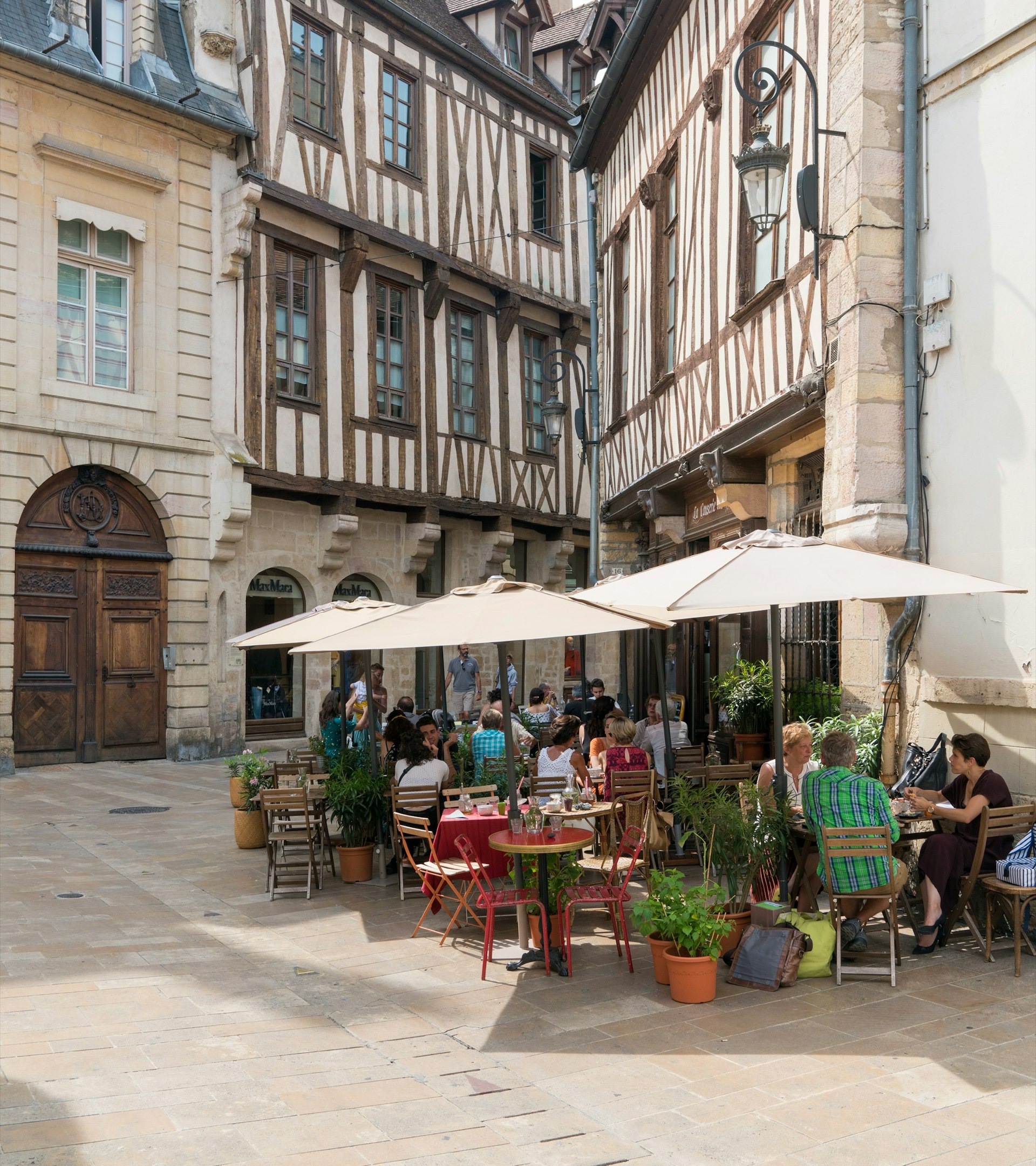
Gastronomical culture
Quality produce, skilled cooking and the act of savoring it in shared company are all integral to the “French gastronomic meal,” recognized on Unesco’s intangible cultural heritage list in 2012 and celebrated at Dijon’s Cité Internationale de la Gastronomie et du Vin (International City of Gastronomy and Wine).
Opened in 2022 on the medieval center’s southwestern edge of Dijon’s medieval center at the former Hôpital Général dating from 1204, cultural activities include culinary-themed exhibitions in its pavilions and a state-of-the-art Pathé cinema. The 16-acre (6.5-hectare) site is home to a gourmet bookshop and specialty shops such as a butcher and bakery, the largest wine cellar in Europe, a bar with more than 3,000 references, and pop-up and permanent restaurants.
Also here is a prestigious wine school, the École des Vins de Bourgogne, and culinary school, Ferrandi (an outpost of its Paris campus), as well as a packed calendar of shorter workshops, classes and demonstrations for all levels, including activities for kids.
Cooking courses in Burgundy
Hands-on cooks will find plenty more places to master the local cuisine across Burgundy. You can follow a morning trip to the market in Beaune at the Cook's Atelier, head down to the 17th-century kitchens at Château d'Ancy-le-Franc, or take a course from a Michelin-starred chef at Le Charlemagne, in the wine village of Pernand-Vergelesses. And that’s just for starters – tourist offices across Burgundy can point you in the direction of others.
Bonding over Burgundy: Cycling the Route des Grands Crus
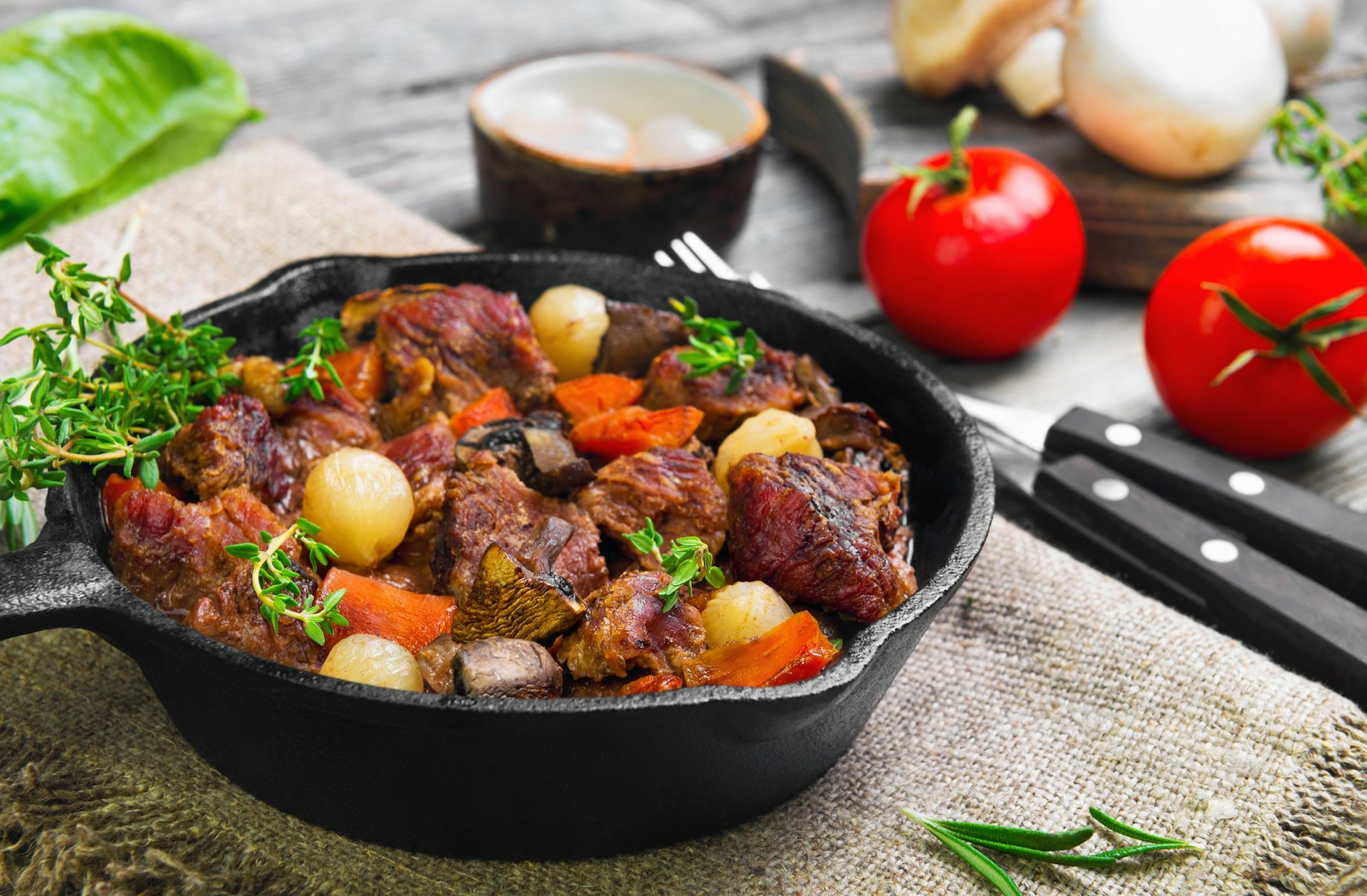
Burgundy’s best-loved dishes
Burgundy teems with atmospheric places to dine, from rustic traditional restaurants to contemporary establishments run by a new generation of Michelin-starred chefs and venerable gastronomical temples. Throughout your travels, don’t miss trying the region’s most iconic dishes.
Popular as a pre-dinner snack with an apéritif or as an appetizer, fluffy, hollow puffs known as gougères are made from choux pastry and grated cheese such as Comté.
Plump, chewy escargots de Bourgogne (Burgundy snails, aka Helix pomatia – long found on the region’s grapevines) cooked in a bouillon are served in shells stuffed with chopped parsley, garlic and butter, and eaten using special snail-shell tongs and a two-prong fork, accompanied by crusty bread.
Silky œufs en meurette are eggs poached in a red-wine meurette sauce with onions, shallots, mushrooms and lardons.
Rich, complex bœuf bourguignon is a hearty stew of Charolais beef slowly simmered in robust Burgundy red wine, flavored with onions, garlic, thyme, carrots, potatoes and mushrooms.
Cooked in white wine, classic chicken dish poulet Gaston Gérard typically incorporates Bresse birds – the only poultry to have French AOC (Appellation d’Origine Contrôlée)/European AOP (Appellation d'origine Protégée) accreditation – as well as sharp, tangy Dijon mustard.
Bonding over Burgundy: A deep dive into its art and architecture
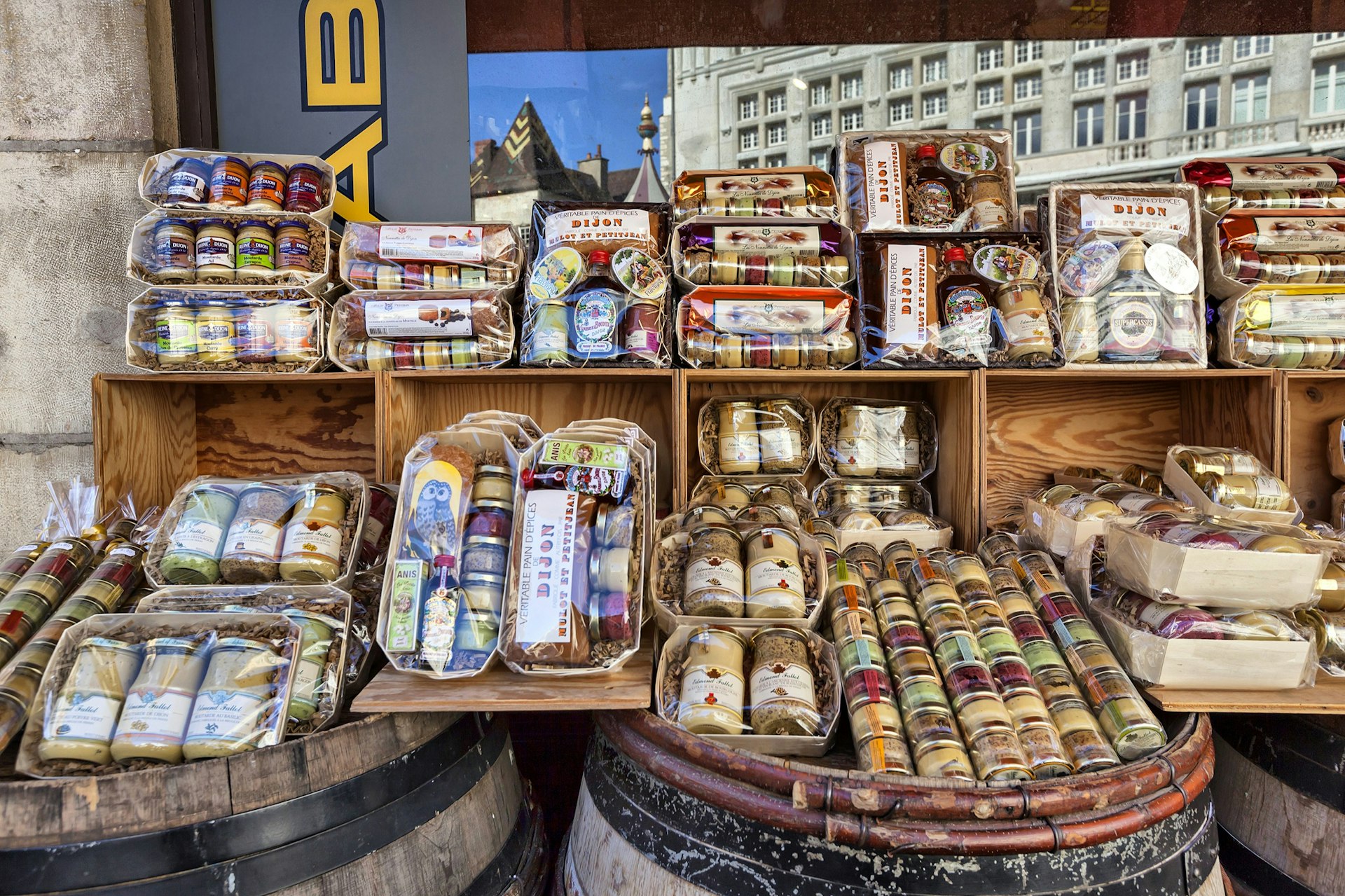
Dijon mustard
Mustard has been part of Burgundy’s food landscape since the Romans co-planted mustard seeds with the first vineyards. Moutarde de Dijon (Dijon mustard) developed in the mid-18th century, when verjus (the acidic juice from green grapes) was used in place of vinegar (although white wine is now more common).
The ubiquitous condiment is famously made by Moutarderie Maille, and still traditionally stone-ground by family-run company Moutarderie Fallot, whose factory in Beaune runs tours.
Burgundy cheeses
When it comes time for fromage in Burgundy, look for its AOC/AOP cheeses, stinky, orange-skinned Époisses, washed in brine and Marc de Bourgogne pomace brandy, and two goat cheeses – large, barrel-shaped Charolais and smaller, conical Mâconnais.
Other heavenly cheeses from the region include soft raw-milk, washed-rind Abbaye de Cîteaux, made by monks at the abbey using milk from their own cow herd. The latest Burgundy cheese is Cabrache du Morvan, made by dairy producers in the mid-mountain region around the Regional Natural Park of Morvan.
Bonding over Burgundy: Exploring medieval history
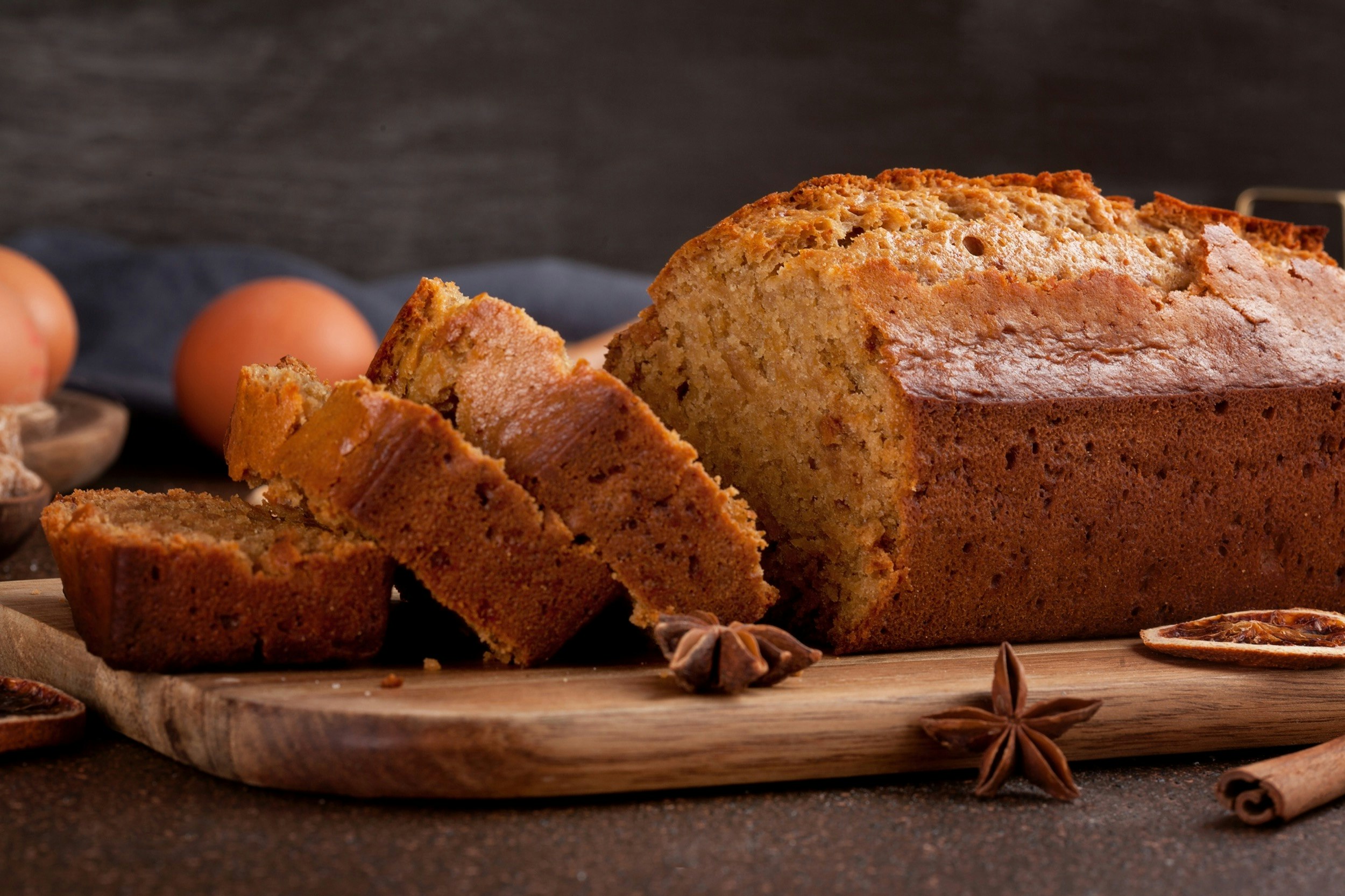
Sweet Burgundy treats
Dijon’s pain d’épices has been a fixture of the city since the French Revolution era. This local variation on gingerbread is made from wheat flour, honey and spices including cardamom, cloves, nutmeg, ginger and aniseed. Mulot & Petitjean still makes it today (its factory, La Fabrique de Pain d'Épices, incorporates a museum); shops include its Hansel-and-Gretel-like half-timbered building on place Bossuet. Another must-try are nonnettes – small, round gingerbread and honey cakes often filled with orange marmalade but also sometimes blackcurrant, chocolate or other ingredients.
Cassis (blackcurrant) is a Burgundy favorite, appearing in desserts such as sorbets as well as drinks featuring sweet crème de cassis (blackcurrant liqueur), such as white-wine-topped Kir. Discover more on a tour at factory-museum Cassissium in Nuits-St-Georges, where you can also try cassis with food pairings. Nearby Ferme Fruirouge sells blackcurrant and other fruits such as strawberries, raspberries and cherries fresh from the farm and also runs tours.
At Burgundy sweet shops, look out for Cassissine de Dijon, liqueur-filled blackcurrant candies.
Tiny round, white aniseed-flavored candies Anis de Flavigny hail from pretty village Flavigny-sur-Ozerain. Green aniseed was planted here in Roman times to treat troops. In the Middle Ages, Benedictine monks made natural aniseed bonbons at the Abbaye de Flavigny, where they’re made by the Troubat family today (visit for a tour and tasting).
